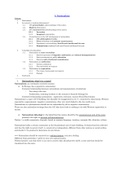5: Nationalism
Content:
1. Nationalism
2. An ancient or modern phenomenon?
2.1. 19C primordialist understandings of the nation
2.2. Modern phenomenon
2.3. 20C constructivist understandings of the nation
2.3.1. Invention
2.3.2. Imagined communities
2.4. Crucial factors to the 19C development of nationalism
2.4.1. 18C philosophical works
2.4.2. Print technology and national consciousness
2.4.3. Napoleonic over-stretching: Anti-French intellectual fervour
2.4.4. Romanticism (combined with anti-French intellectual fervour)
3. A typology of nationalism
3.1. Nationalism as state centralism
3.1.1. State-led processes of linguistic unification and cultural homogenisation
3.1.2. State investments in public education
3.1.3. State-led cult of national remembrance
3.2. Nationalism as unification
3.2.1. German unification
3.2.2. Pan-nationalist movements
3.3. Nationalism as separatism
3.3.1. Two types of autonomist movements
3.3.2. Finland
4. Conclusion
1. Nationalism: what’s in a name?
Nationalism: an essentially contested concept.
● In Europe, has a pejorative connotation:
- Contested relationship between nationalism and expansionism, irredentism
- Not always the case.
- Irredentism: restoring territory to the country it formerly belonged to.
- Contested relationship nationalism - superiority, exclusion, racism (Social Darwinism).
Nationalism is a part of N-S building, but shouldn’t be exaggerated as it’s +/- connected to chauvinism, Western
superiority, expansionism. }negative connotations. Also very much linked to the two world wars.
Nationalism as a phenomenon should not be confounded by all its negative connotations.
There are also nationalist writings from the 19C that have little to nothing to do with Western superiority or
racism.
● Nationalism (ideology) = the belief that the nation should be the organizational unit of the state;
promotes the right to national self-determination.
Nation = a stable community of people, based on common language, territory, economic life, ethnicity, culture.
Nationalism holds a certain community as the foundational unit of state-building. It claims that this collective
unit has the right to govern itself - is conceived as independent, different from other nations or social entities
and should => be granted to determine its own future.
==> Nationalism should be conceived as a political project, not just a feeling.
Different from patriotism = pride in your own nation/country.
Political project: says that there is an unit in society that should govern itself. a neat unit that should be
translated into the state.
, ● Nationalism = a “thin” ideology: appears mostly in combination with other ideologies.
Especially among European intellectuals, it developed into a political thought in and of itself, but in practice, it’s
often linked with liberal thinking or conservative thought.
Disconnection between progressive nationalist thought (in terms of theories) VS the political practices that led
to the outbreak of WW1 and to imperialism.
==> In practice, it’s a strand of political thought that combines with other ideologies & hence takes on different
forms.
● A political project: promotion of the nation-state
- Nation as the central organising principle of the state.
- State as the most effective organisation of the nation and its protector (from international invasions).
==> Every nation deserves its own state. (national self-determination)
● Relationship “popular sovereignty” and “national sovereignty”
- Vertical: popular sovereignty = the expression of the ‘rule by the people’
- Authority to rule should come from below, from the people. Relationship between a nation and
those governing it. → Consent of the ruled. (vertical: between the people and its state)
- But how do you demarcate ‘the people’?
- Horizontal: Nation-State = international protection to popular sovereignty.
Creation of a state also protects self-determination rights of a people against its neighbouring nations and
states. ==> horizontal relationship between different nations that recognise each other.
2. An ancient or modern phenomenon?
2.1. The 19C was dominated by primordialist understandings of the nation.
(primordialist → from the beginning of time, primeval, fundamental)
● Nations = update of ancient tribes, language groups, ethnicities.
The nations of today, those that flourished in C19, are newer versions of much older senses of familiarity, senses
of connection. Ancient tribes, ethnicities, language groups, constantly throughout history updated until they
amounted to the “modern N-S”.
● Emphasis on historical continuity between modern nations and pre-modern communities.
● Intellectual investments in tracing historical roots; language families.
- Mapping out language families - finding connections between different dialects to reveal units.
2.2. However, European nationalism is best understood as a modern phenomenon.
There are many ruptures and discontinuities between ancient tribes and modern day people.
- AR: people identified as subjects (to the throne), not as members of a nation (or a broader collective).
It was mainly the elite, academics, (statesmen) who read ancient texts to prove their people’s superiority/trace
its lineage.
In practice, very little experience of a national belonging before C19.
This changes in C19:
- Nation-building is triggered by processes of ruptures: industrialisation, standardisation of language,
state centralisation (bureaucracy) and the development of shared public spheres.
(bureaucracy - public education, increased literacy rates, people conversing in a shared language)
Shared language → through communication being able to discover commonalities → finding themselves
connected by certain shared cultural heritages or historical remembrances.
Standardization of language, industrialisation, development of print technology, growing literacy rates, books
becoming cheaper (as a result of industrialisation)]- greatly helped to create a shared public sphere.
Allowing people to meet, converse, think of each other as belonging to the same unit.




